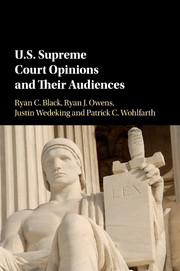Book contents
- Frontmatter
- Dedication
- Contents
- Acknowledgement
- 1 Introduction
- 2 A theory: using opinion clarity to enhance compliance and manage public support
- 3 Estimating the clarity of Supreme Court opinions
- 4 Supreme Court opinions and federal circuit courts
- 5 Supreme Court opinions and federal agency implementors
- 6 Supreme Court opinions and the states
- 7 Supreme Court opinions and the secondary population
- 8 Establishing compliance as a function of clarity
- 9 Conclusion
- References
- Index
6 - Supreme Court opinions and the states
Published online by Cambridge University Press: 05 February 2016
- Frontmatter
- Dedication
- Contents
- Acknowledgement
- 1 Introduction
- 2 A theory: using opinion clarity to enhance compliance and manage public support
- 3 Estimating the clarity of Supreme Court opinions
- 4 Supreme Court opinions and federal circuit courts
- 5 Supreme Court opinions and federal agency implementors
- 6 Supreme Court opinions and the states
- 7 Supreme Court opinions and the secondary population
- 8 Establishing compliance as a function of clarity
- 9 Conclusion
- References
- Index
Summary
In Alexander v. Choate (1985), the Supreme Court decided whether the changes Tennessee made to its Medicaid procedures violated the Federal Rehabilitation Act of 1973. Faced with a budget shortfall, Tennessee decided to reduce (from 20 to 14) the number of inpatient hospital days it would cover for Medicaid recipients. In response, a class of Medicaid recipients challenged the reduction, claiming it discriminated against the handicapped in violation of the Rehabilitation Act. Their argument was that since handicapped people used Medicaid services more than non-handicapped people, the reduction would disproportionately harm them. And this, they said, ran afoul of the law. The Supreme Court disagreed.
In a unanimous decision by Justice Thurgood Marshall, the Court held states could change their inpatient coverage using such neutral methods. Because the state made its Medicaid benefits equally accessible to handicapped as well as non-handicapped citizens, there was no legal violation. Moreover, there was nothing in the law or legislative history to suggest that, because the handicapped might be affected more than others, Tennessee ran afoul of the Act. The law did not, according to the Court, address neutral motivations that had a disparate impact. As the Court stated:
The reduction in inpatient coverage will leave both handicapped and non-handicapped Medicaid users with identical and effective hospital services fully available for their use, with both classes of users subject to the same durational limitation … Medicaid programs do not guarantee that each recipient will receive that level of health care precisely tailored to his or her particular needs. Instead, the benefit provided through Medicaid is a particular package of health care services, such as 14 days of inpatient coverage.
While the majority opinion in the case is of roughly average clarity, earlier drafts were not so clear. And some justices believed that lack of clarity might lead to poor compliance among states. For example, in response to an earlier opinion draft in the case, Justice Powell told Marshall: “there is a substantial amount of dicta that is unnecessary to a decision of this case, and that may cause trouble for us … ” Justice O'Connor put the matter more strongly: “I am concerned that because of its length and complexity it may not furnish the helpful guidance that [state] agencies affected by section 504 [of the Rehabilitation Act] need for their day to day operation.” […]
- Type
- Chapter
- Information
- US Supreme Court Opinions and their Audiences , pp. 97 - 121Publisher: Cambridge University PressPrint publication year: 2016
- 1
- Cited by



